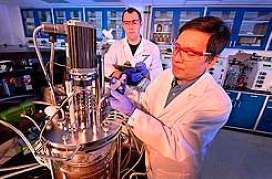Research: New bioenergy yeast strain could cut costs

Researchers at the US Department of Agriculture (USDA) have developed a new strain of yeast that could help streamline cellulosic ethanol costs and production.
Molecular biologist Z. Lewis Liu (right) and technician Scott Weber add a new yeast strain to a corn cob mix to test the yeast’s effectiveness in fermenting ethanol from plant sugars. – Photo: ARS
This work, which supports the USDA priority of developing new sources of bioenergy, was conducted by Agricultural Research Service (ARS) scientists at the agency’s National Center for Agricultural Utilization Research in Peoria, Ill. ARS is USDA’s chief intramural scientific research agency.
ARS molecular biologist Zonglin Lewis Liu and his colleagues determined that this yeast strain can break down and ferment the sugars in corn cobs left behind after the compound xylose—which is sometimes used for industrial activities—has been extracted. The new strain of yeast, Clavispora NRRL Y-50464 (Y-50464), can tolerate cob-derived compounds that interfere with yeast growth and fermentation rates.
It is able to grow rapidly at 98.6 °F, so it thrives at the higher temperatures needed to optimize simultaneous saccharification and fermentation (SSF) rates. SSF is a one-step process in cellulosic ethanol production that combines releasing and fermenting feedstock sugars.
The researchers compared how quickly Y-50464 and another yeast strain could release and ferment the sugar in corn cob residues after the xylose had been extracted. The new yeast strain was able to start consuming the residue at a steady rate 24 hours after the test began. The comparison yeast didn’t grow at all under the same conditions.
The scientists added the enzymes cellulase and beta-glucosidase, which are often used to break down residues and extract sugars, and observed that Y-50464 reached its peak ethanol production rate of 25.7 grams per liter 5 days after the experiment began. But the yeast actually produced more ethanol, 26.6 grams per liter in 5 days, without the addition of beta-glucosidase.
Testing by Liu’s group confirmed that Y-50464 contains beta-glucosidase, which means that using this yeast for cellulosic ethanol production would eliminate the need to include the cost of an additional enzyme to the process. Liu will continue exploring options for combining the desirable characteristics of Y-50464 with additional enzymes to further improve bioprocessing for advanced biofuels production.











Vélemény, hozzászólás?
Hozzászólás küldéséhez be kell jelentkezni.